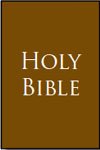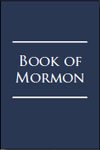Anachronisms — King James Version
The Book of Mormon quotes anachronistically from the King James Version.
- In his paper “New Testament Words and Quotations in the Book of Mormon,” Terrance L. Chambers, Ph. D., identified 441 anachronistic New Testament quotations in the Book of Mormon. The New Testament was written over 650 years after Lehi and his family left Jerusalem for the New World in the Book of Mormon narrative.
A Selection of Anachronistic Quotations
-
Acts 3:22-23
The Book of Acts records Apostle Peter paraphrasing Moses (Deuteronomy 18:18-19) during his sermon at Solomon’s Portico around 60 AD. In the Book of Mormon, 640 years prior, Nephi quotes not Moses, but Peter’s paraphrasing of Moses nearly verbatim.
 |
 |
||
|
For Moses truly said unto the fathers, A prophet shall the Lord your God raise up unto you of your brethren, like unto me; him shall ye hear in all things whatsoever he shall say unto you. And it shall come to pass, that every soul, which will not hear that prophet, shall be destroyed from among the people. |
Moses, which he spake, saying: A prophet shall the Lord your God raise up unto you, like unto me; him shall ye hear in all things whatsoever he shall say unto you. And it shall come to pass that all those who will not hear that prophet shall be cut off from among the people. |
||

|
— Apostle Peter
60 AD
|

|
— 1 Nephi
580 BC
|
-
Romans 8:6
Nephi plagiarizes Apostle Paul 600 years before he wrote his epistle to the church at Rome.
 |
 |
||
|
For to be carnally minded is death; but to be spiritually minded is life and peace. |
To be carnally-minded is death, and to be spiritually-minded is life eternal |
||

|
— Apostle Paul
68 AD
|

|
— 2 Nephi
555 BC
|
-
1 Corinthians 15:53
Mosiah plagiarizes Apostle Paul 200 years before he wrote his epistle to the church at Corinth.
 |
 |
||
|
For this corruptible must put on incorruption, and this mortal must put on immortality. |
Even this mortal shall put on immortality, and this corruption shall put on incorruption. |
||

|
— Apostle Paul
55 AD
|

|
— Mosiah
148 BC
|
-
Matthew 3:10
Alma plagiarizes John the Baptist about 80 years before he was born.
 |
 |
||
|
And now also the axe is laid unto the root of the trees: therefore every tree which bringeth not forth good fruit is hewn down, and cast into the fire. |
And again I say unto you, the Spirit saith: Behold, the ax is laid at the root of the tree; therefore every tree that bringeth not forth good fruit shall be hewn down and cast into the fire. |
||

|
— John the Baptist
30 AD
|

|
— Alma
83 BC
|
Anachronisms — Linguistic Errors
| 600 BC | 329 BC | 300-200 BC | 50-100 AD |
|---|---|---|---|
|
Jews exiled to Babylon and learn Aramaic
Book of Mormon: small group of Jews flee to the New World |
Hellenization: Greek influence over Israel | Septuagint: OT translated into Greek | Books of the NT written |
| 382-405 AD | 421 AD | 1611 AD | 1830 AD |
|---|---|---|---|
| Latin Vulgate: Jerome translates Bible into Latin | Book of Mormon (Reformed Egyptian) record ends and is buried | King James translation of the Bible into English | Book of Mormon published |
The original books that comprise the Bible were written in three languages:
- Hebrew and partly Aramaic (Old Testament)
-
Greek (New Testament)
Alexander the Great’s conquest of much of the civilized world, including Israel, resulted in Koine (common) Greek replacing Hebrew and Aramaic as the primary language of the Jews. That is why the books of the New Testament were written in Greek. - Eventually, the Old Testament was also translated into Greek—called the Septuagint.
- The writers of the books of the New Testament quote interchangeably between the Hebrew / Aramaic and Greek Septuagint Old Testament books.
Anachronisms — Linguistic Errors, Greek
In the Book of Mormon narrative, around 600 BC, a small group of Jews flee to the New World, and are permanently separated from the Hellenization of Israel that would take place three centuries later. Greek words and concepts would be foreign to them, so we should not expect to see Greek words in the Book of Mormon.
- A selection of Greek words used in the Book of Mormon
| Alpha and Omega | The first and last letters of the Greek alphabet should not be found on an ancient Reformed Egyptian text. | ||||||||
| Apostle | The first Apostles were commissioned by Jesus Christ around 30 AD. The word apostle is from the Greek apostolos. In the Book of Mormon, an angel asks Nephi if he remembers the twelve apostles 600 years before Jesus was born. | ||||||||
| Christ |
‘Christ’ is from the Greek Christos, which is a translation of the Hebrew Mashiach (Messias / Messiah), which means ‘anointed one’. The word Christ is not used in the Old Testament. We do see Messias used in the New Testament, and it even explains the translation.


|
||||||||
| Timothy | Timothy is from the Greek Timotheos. | ||||||||
Anachronisms — Linguistic Errors, Latin
Latin in the New Testament
As a result of the Roman occupation of Israel that began in 63 BC, we see a smattering of Latin words and terms used in the books of the New Testament:- Names: Caesar Augustus, Pontius Pilate
- Military: Legion, Centurion, Praetorium
- Coinage: Denarius, Quadran
- As Roman influence grew, naturally, various Latin translations of the biblical books developed—called Vetus Latina. By 405 AD, Jerome had completed a Latin translation of the entire Bible—called the Latin Vulgate—which became the official bible used by the Catholic church.
- A selection of Latin words used in the Book of Mormon
- Joseph Smith admitted that Greek and Latin were not on the Reformed Egyptian gold plates.
- Is this 147 BC Judaism or 1830 AD Christianity?
Latin in the Book of Mormon
The Jews in the Book of Mormon left for the New World over 500 years before the Roman occupation of Israel and a millennium before Jerome’s Latin Vulgate. So we should not expect to see Latin words in the Book of Mormon.| Bible | ‘Bible’ is from the Latin Biblia. The last book of the Bible was written as late as 90-100 AD, and the canonization of all the biblical books was developed thereafter. The Bible never calls itself the ‘Bible’. However, the Book of Mormon speaks of the Bible by name 600 years before the New Testament was ever written. | ||||
| Revelation | From the Latin revelatio—not used in the Hebrew Old Testament, but used 31 times in the Book of Mormon, as early as 588 BC. | ||||
| Religion |
From the Latin religio—not used in the Hebrew Old Testament, but used 10 times in the Book of Mormon, as early as 72 BC.
Consider these passages from the book of Alma: 
|
||||

There was no Greek or Latin upon the plates from which I, through the grace of God, translated the Book of Mormon. | |
 | — Joseph Smith
Mormonism founder
|
Anachronisms — Theology
The author of the Book of Mormon was familiar with Christian theology and interjected those concepts into the book’s pre-Christ era.
| Baptize / Baptism | From the Greek baptizein. Introduced in the Gospels by John the Baptist. Not used in the Old Testament and Septuagint. However, it is used 139 times in the Book of Mormon, as early as 600 BC. | ||||
| ‘God the Father’ | The concept of God as father is presented in the Old Testament in terms of His father / child relationship with Israel. This was fully realized when Jesus Christ declared “Abba Father” (Mark 14:36, Romans 8:15, Galatians 4:6). The title ‘God the Father’ is not used in the Old Testament. However, it is used 14 times in the Book of Mormon, as early as 124 BC. | ||||
| Gospel | From the Old English godspel, from the Greek euangelion. Introduced by Jesus Christ, meaning ‘good news’. Not used in the Old Testament. However, it is used 41 times in the Book of Mormon, as early as 600 BC. | ||||
| ‘Kingdom of God’ | This phrase is unique to Christianity and is not used in the Old Testament. However, it is used 38 times in the Book of Mormon, as early as 600 BC. | ||||
| ‘Kingdom of Heaven’ | This phrase is unique to the Gospel of Apostle Matthew. It is not used in any other Old or New Testament book. However, it is used 17 times in the Book of Mormon, as early as 600 BC. | ||||
| ‘Lamb of God’ | This phrase is unique to the Gospel of Apostle John. It is not used in any other Old or New Testament book. However, it is used 35 times in the Book of Mormon, as early as 600 BC. | ||||
| ‘Mysteries of God’ | This phrase is used by Apostle Paul once (1 Corinthians 4:1). Paul also uses ‘Mystery of God’ (Colossians 2:2) as does Apostle John (Revelation 10:7). It is not used in any other Old or New Testament book. However, it is used eight times in the Book of Mormon, as early as 600 BC. | ||||
| ‘Son of God’ | While ‘sons of god’ is used to label angels in the Old Testament, the title ‘Son of God’ is unique to Christianity as a title for Jesus Christ. The Book of Mormon uses this title 54 times, as early as 600 BC. | ||||
| Resurrection | From the Latin resurgere. The concept of coming back from the dead is in the Old Testament (Psalm 17:15, Daniel 12:2, Isaiah 26:19). ‘Resurrection’ as a technical term and concept is unique to the New Testament. However, it is used 81 times in the Book of Mormon, as early as 588 BC. | ||||
| Weekly worship |
In Judaism, worship services are held daily. However, a weekly worship service is unique to Christianity.

|
||||






